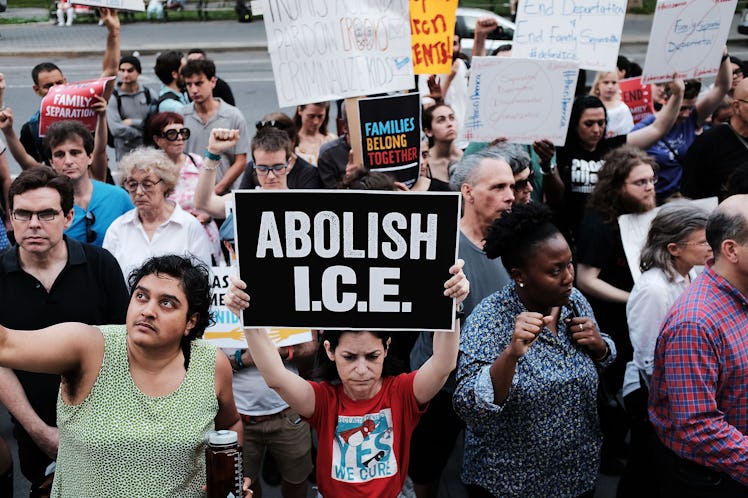
Here's What Would Have To Happen For ICE To Be Abolished
On Tuesday, June 26, the House primary won by Alexandria Ocasio-Cortez in New York wasn't just a victory for a young Democrat. It was a win for a liberal candidate who ran on what is slowly becoming a more popular campaign promise: Abolish ICE, the Immigration and Customs Enforcement agency. But because of the nature of campaign promises in politics — which can gain popularity regardless of their feasibility — it's worth wondering, can ICE be abolished?
The answer is yes.
ICE is a federal law enforcement agency that operates under the U.S. Department of Homeland Security. In the past, there have been agencies that have been abolished, with some of their duties being transferred to other agencies and departments.
Here's one example.
In October 1999, the U.S. Information Agency (USIA) was abolished. A year earlier, President Bill Clinton signed a federal spending bill that included the abolition of the agency — along with another, the Arms Control and Disarmament Agency — within its language.
By the time USIA was abolished, it had around 6,000 employees and had been in existence for 46 years. ICE, in contrast, has been around for less than two decades, after its creation in 2003. After 1999, some of the roles performed at USIA were transferred to the State Department.
Any scenario in which ICE were abolished would probably require a similar event: a bill signed by the president, with language about transferring some of the agency's most essentially functions to other federal bodies. That's the exact type of process outlined by Randy Bryce, a Democratic challenger in Wisconsin's first congressional district, which is currently represented by House Speaker Paul Ryan.
"ICE has grown power-hungry, sucking up more and more federal resources and directing them toward the deportation of children and families who have lived here for years and who are otherwise completely law-abiding," Bryce told Newsweek in April. "I think that ICE should be abolished and Congress should explore which existing agency could best house immigration and customs enforcement, so that only those who pose a true threat to our country’s security face deportation."
That's where the discussion about abolishing ICE gets tricky, though.
For now, "Abolish ICE," is mostly a rallying call that is being embraced by progressive candidates competing in Democratic primaries ahead of the 2018 midterm elections, like Ocasio-Cortez.
But even the prominent senator Ocasio-Cortez once worked for as a campaign organizer, Vermont's Bernie Sanders, who's viewed by critics as a radical liberal, evaded a firm answer this week when asked by CNN's Jake Tapper whether he supports abolishing ICE.
"I think what we need is to create policies which deal with immigration in a rational way," Sen. Sanders told Tapper.
Another prominent Democrat, and, many believe, 2020 presidential hopeful, went further in the opposite direction. During a recent appearance on MSNBC's All In, California Sen. Kamala Harris explicitly supported maintaining the existence of ICE. Harris said,
I believe that there needs to be serious, severe and swift consequence when people commit serious and violent crimes ... and certainly if they are undocumented they should be deported if they commit those serious and violent offenses. So yes, ICE has a purpose, ICE has a role, ICE should exist. But let’s not abuse the power. Let’s not extend it to areas that are not posing a threat to the safety and the public safety of these communities.
In others words, abolishing ICE isn't a simple matter of Democrats winning back a majority in Congress. It'd probably require a majority in Congress, if not a super majority, and a Democratic president to be elected, to even have hope of proposing a viable bill.
On top of that, there would have to be a major shift in what the majority of the party thinks about the existence of ICE, because for now, top Democrats are far from endorsing the abolition of the agency.
It's a long process, but one that progressives would hope starts with nominating candidates like Alexandria Ocasio-Cortez.